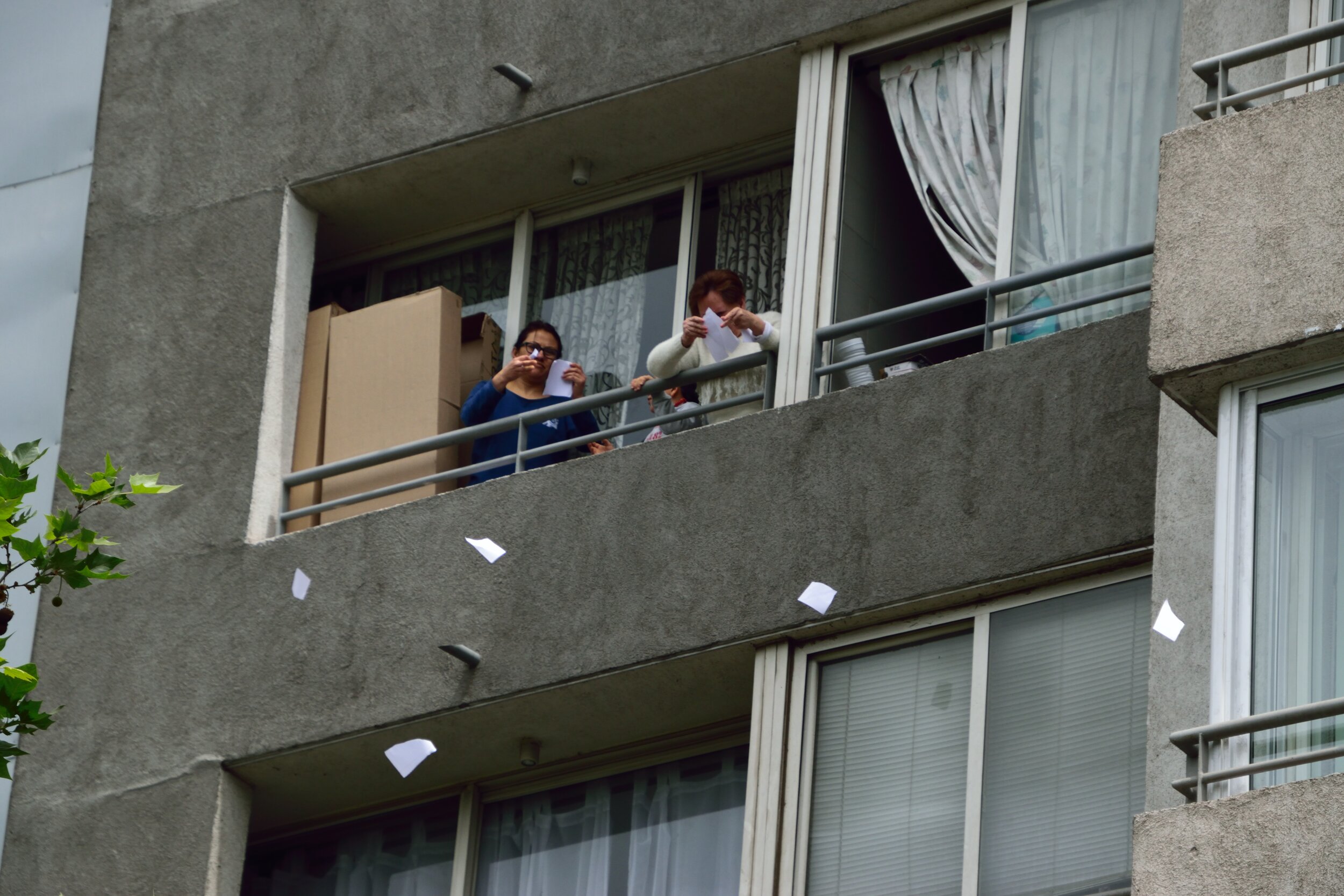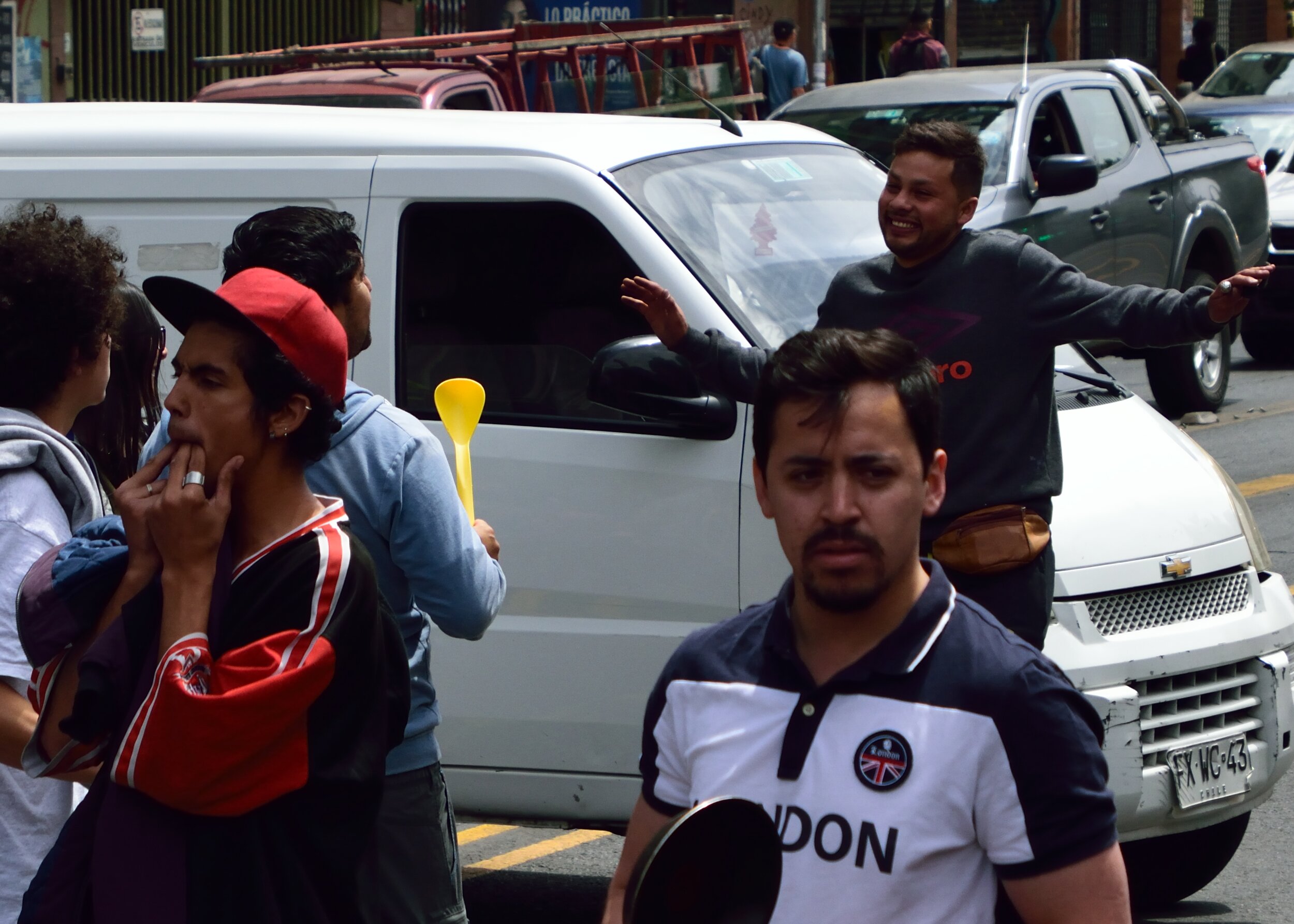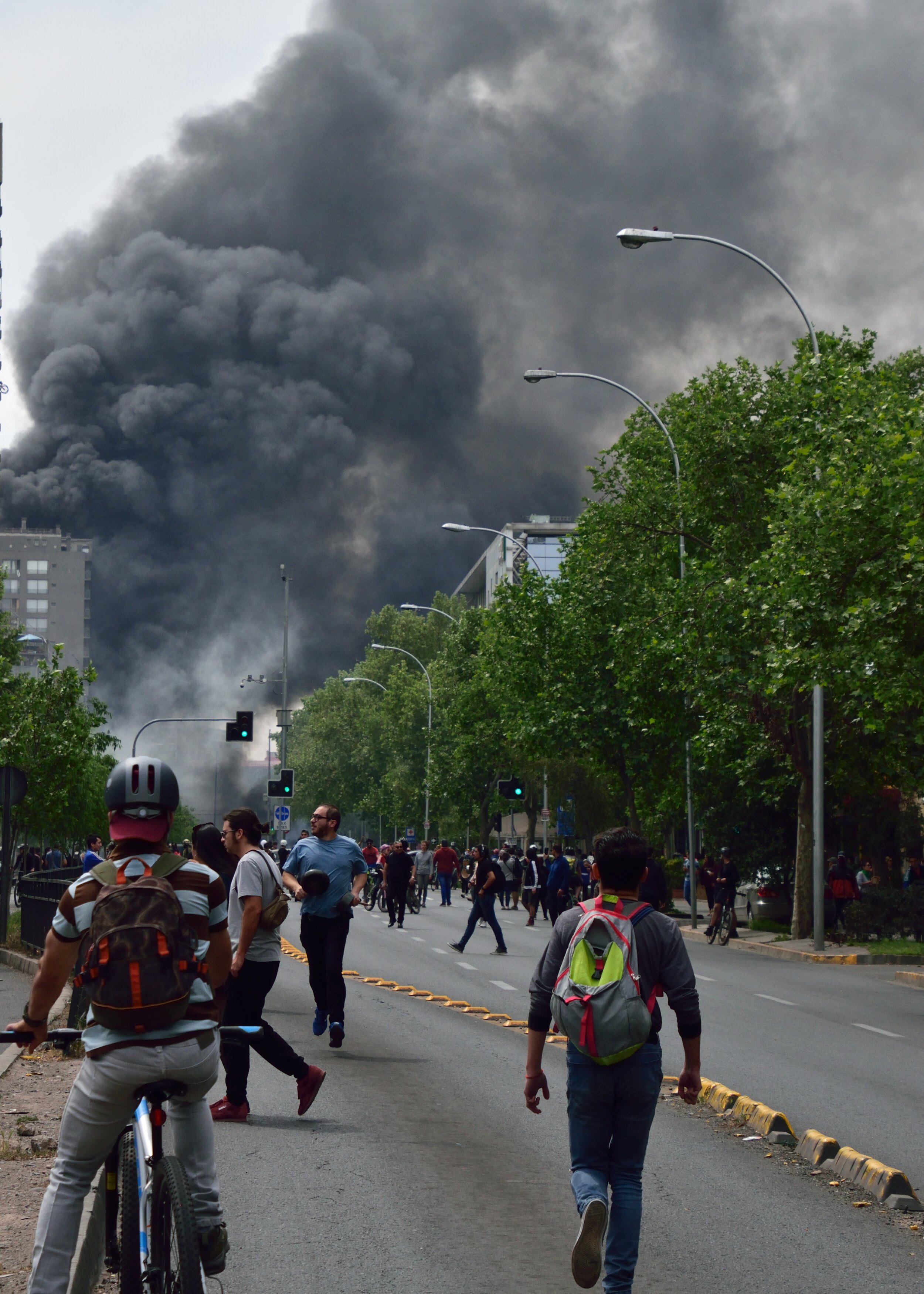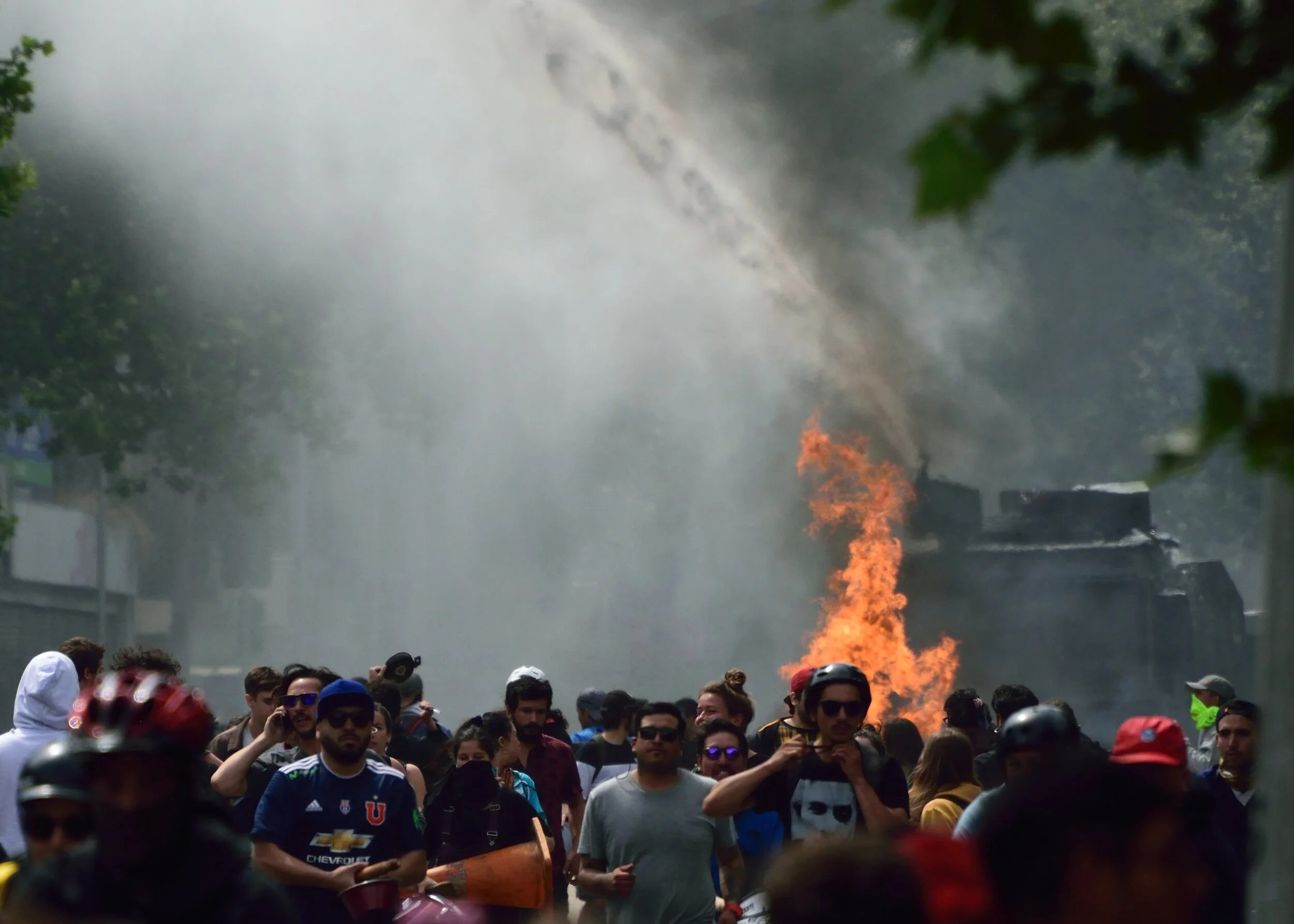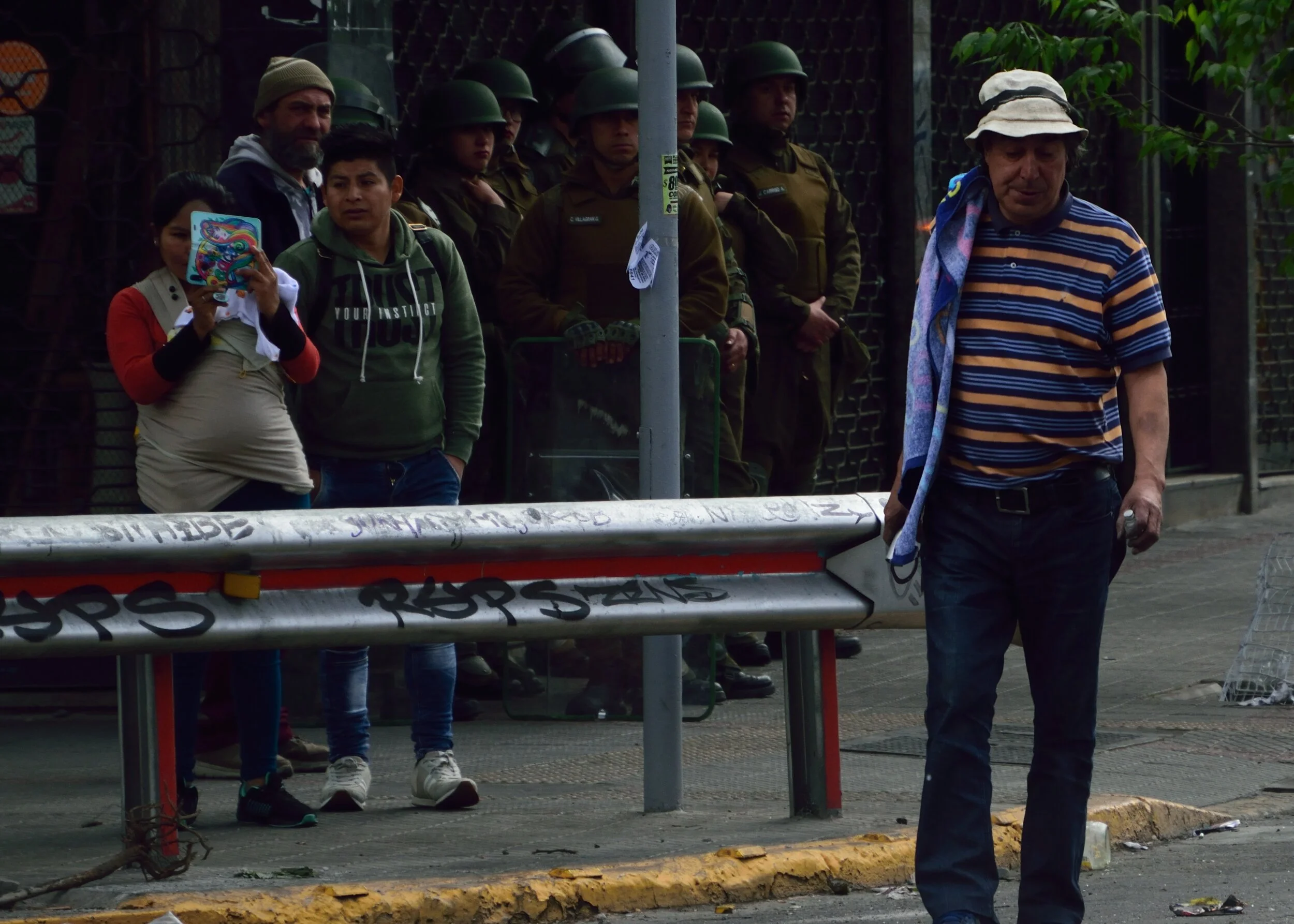Chile Despertó / Chile Woke Up
I captured these photos of the Chilean popular uprising in October and December of 2019. I tried my best to capture the energy of the streets, bear witness to this historic moment, and keep myself and friends safe while we stood in solidarity with our Chilean friends and neighbors. Some of these images were used in Human Rights Crisis in Chile: A Digital Inquiry - students, staff, and faculty affiliated with the Human Rights Investigations Labs at the University of California, Berkeley and the University of California, Santa Cruz organized the information contained in this ArcGIS StoryMap. This photo spread will remain a separate page on my website, with occasional updates.
Tomé esas fotos de la rebelión Chilena en octubre y diciembre 2019. Hice todo lo que pude para capturar la energía de las calles, ser testigo al momento histórico, y tener cuidado a mí y mis compañeros/as mientras nosotros/as estábamos de pie en solidaridad con nuestros amigos/as y vecinos/as de Santiago. Unas de esas fotos fueran usados en Human Rights Crisis in Chile: A Digital Inquiry - estudiantes, empleados/as, y facultad afiliada con el Human Rights Investigations Labs en la Universidad de California, Berkeley y la Universidad de California, Santa Cruz organizaban la información contenida en esa AcrGIS StoryMap. Esa selección de fotos se quedará como una página separada en mi sitio de web, con actualizaciones ocasionales.
Protestors occupied their neighborhood and shut down a busy intersection, 19 October 2019. Manifestantes ocuparon su barrio y cerraron una esquina en Providencia.
On Saturday, October 19th, 2019 we woke up after a night filled with the sounds of Chileans banging pots and pans and protesting throughout the neighborhood of Providencia where my friends lived in Santiago. A week later, the manifestations reached their largest sizes – the biggest protests in Chile’s history.
El sábado, 19 de octubre 2019, nos despertábamos después de una noche llenaba con los sonidos de residentes de unas personas participando en un cacerolazo por las calles y desde sus balcones en el barrio Providencia, donde vivián mis amigas en Santiago. Una semana después, las manifestaciones estarán las más grandes de la historia de Chile.
An older man from the neighborhood passionately chanting alongside his community.
A toddler carries a spoon and small pot while she sits on her dad’s shoulders.
The people who took to the streets seen here near my friends’ home - were from all generations, and the vibe for several hours was buena onda. All day long that Saturday, Chileans occupied the streets in their neighborhoods and chanted, sang songs, greeted each other energetically and without fear.
La gente que salieron a la calle, los y las vecinos/as de mis amigas, componieron de todas las generaciones - y la vibra por unas horas durante el día estaba muy buena onda. Todo el día este sábado, Chilenas y Chilenos ocuparon las calles en sus barrios y gritaron, cantaron, y se saludaron con alta energía y sin miedo.
Just down the block, a couple fought with a pair of bodyguards, seen below with radios, brass knuckles and matching “I’m here to help you” polos - an early indication of the intensity that would follow for weeks in the capital city and throughout the country.
En la calle cerca del grupo de manifestantes, una pareja pelearon con unos guardaespaldas que tenían radios, nudillera, y sus camisas escritas con un mensaje “Estoy para ayudarte” - un anticipo del caos e intensidad que se guiaba para semanas en el capital y por todo el país.
Around 3:00pm we looked north on Avenida Vicuña Mackenna toward the intersection with Rancagua and saw a massive column of black smoke rising from where five busses were burned.
Cerca de las 3 pm vimos al norte por la Avenida Vicuña Mackenna con Rancagua y vimos una columna masiva de humo negro subiendo donde hayan quemado cinco buses.
Five city busses burn on Avenida Vicuña Mackenna, 19 October 2019.
Between the burning busses and where we were, protestors had constructed one of thousands of barricades throughout the city; police cleared up the crowd there while firefighters extinguished the city busses. People did not disperse too willingly, folks in the neighborhood began looting a gas station and supermarket in the ensuing chaos.
Entre los buses quemando y donde estábamos nosotros/as, manifestantes hayan construido uno de millones de barricadas en la ciudad; los carabineros empujaban el pueblo detrás mientras los bomberos entraron y extinguieron el fuego de los buses. El pueblo no salieron por voluntad propia, y algunxs del barrio empezaban saquear una gasolinera y supermercado.
Just before 6:00pm on Saturday, a Salcobrand pharmacy at Santa Isabel & Vicuña Mackenna was targeted by arsonists, but firefighters arrived quickly on the scene.
Una farmácia Salcobrand en Vicuña Mackenna con Santa Isabel era el objetivo de unos/as pirómanios/as, pero llegaron rápidamente un equipo de bomberos.
A pharmacy begins to burn as onlookers occupy the intersection, 19 October 2019.
A young man with his face covered and wearing latex gloves pushes a cart through an intersection filled with protestors and a fire brigade, 19 October 2019. Un joven saqueador.
That night was the first evening of a military-enforced curfew, the first time the citizens of Chile have been subjected to military rule since the Pinochet dictatorship. The protests that erupted after weeks of student-led evasions at metro stations in response to a raise in fares stem from decades of rising inequality. Wages have remained low while living costs rise; Chile is a wealthy country, and one of the world’s most unequal nations, where the wealth is concentrated in the hands of the ruling elite class. The massive protests for education reform that flared up nearly ten years ago carry on in today’s movement, with Chileans calling for policies that would create more affordable and higher quality education available to all citizens. Other protestors are asking for reformed healthcare and pension systems, the streets have been filled with healthcare and education system workers for months now. The Mapuche flag flies high at rallies as the most recent conflicts between indigenous communities clash with state forces. Feminists have also represented a huge constituency of folks demanding safe and affordable access to abortion and protection of womens’ rights; the iconic chant Violador en el Camino has become a global phenomenon. Democracy is alive and well in the protests and organizing spaces of activists who demand a new and civilian-powered constitution.
My friends and I stayed updated on social media while we could hear people in the neighborhood carrying on the protests late into the night. The next morning around 11:30am, the burned-out busses and broken glass lay in the street, while people swept up their sidewalks and replaced overturned potted plants.
Esa noche era el primer día de un toque de queda, ejecutaron por los militares, y era la primera vez que salieron el ejército a la calle desde tiempos de la dictadura de Pinochet. Las protestas que empezaron después de unas semanas de evasiones de estudiantes en los metros de Santiago provienen desde años de desigualdad. Sueldos han estado muy bajo mientras el costo de vivir siga subiendo; Chile es un país rico, uno de los países más desigual, donde la riqueza está concentrada en las manos de la élite. Las protestas masivas llamando por reformas del sistema educativo hace casi 10 años están infiltrando el movimiento popular de hoy, con Chilenos/as llamando por una política más justa. Otras manifestantes piden por un sistema mejor de salud y pensión, las calles llenas de profesionales del sistema de salud y educación. La bandera Mapuche voló alta en las calles, mientras el estado pelea con comunidades indígenas. Las feministas representan derechos de mujeres, acceso al aborto - ahora la colectiva Las Tesis es conocido por todo el mundo. La democracia vive en las calles, con muchas personas llamando por una constitución nueva.
Mis amigas y yo vimos las noticias por redes sociales, mientras escuchábamos los y las vecinos/as gritando y protestando hasta muy tarde en la noche. La próxima mañana cerca de las 11:30am, los buses quemados y vidrio quedaron en la calle y el pueblo limpiaron sus calles y recolocaban las macetas.
A police officer walks in front of a burned-out bus toward an intersection to direct traffic, 20 October 2019. Un carabinero camina frente de un bus quemado, guiando el tráfico en la esquina.
Around noon on Sunday, October 20th, a few folks had gathered at Plaza Italia, soon to be renamed Plaza de la Dignidad. The riot police expelled the few dozen peaceful protestors.
Cerca del mediodía el domingo 20 octubre, unas personas ya habían manifestado en Plaza Italia - que ahora conocemos como Plaza de la Dignidad. Los carabineros expulsaban las manifestantes pacíficas.
Three carabineros stand below the statue of General Manuel Baquedano, recenty defaced and given a bandana, 20 October 2019. 3 carabineros bajo la estatua del General Baquedano, que llevaba una bandana.
The military ordered to the street by the president held their massive firearms while directing traffic, the street lights in many parts of Providencia having been torn down to make blockades.
Los milicos con órdenes de controlar las calles tenían armas de fuegos mientras dirigieron tráfico, las señales de tráfico quitaban por manifestantes por muchas partes de Providencia para hacer barricadas.
It was a warm Sunday around 4:00pm, and the fires burning cars and debris kept the city mostly shut down – protestors continued to gather in the plaza that night and grow in massive numbers, but this would be the last time I took out my camera during the week I was in Santiago.
Era un domingo muy caloroso cerca de las 4:00 pm, y los fuegos de barricadas y carros quemando mantuvieron la ciudad cerrada - manifestantes llegaron a la plaza esta noche y crecieron en números inmensos, pero esa tarde será la última vez que salí con mi cámara durante una semana de protesta.
I returned to Santiago, to the neighborhood where it all started, exactly two months after the real ignition of this movement. In two months time, the streets remained occupied by civilians and riot police, the walls of buildings covered, repainted, and re-covered in graffiti. In the middle of Parque Balmaceda, a band played a cueca song while people nearby stepped up to dance. Police led away a man in handcuffs, and their colleagues nearby ID’d a few people who looked to be sleeping in the park. It was around 5:00pm on a Friday, and early mobilizations of protestors had shut down a few metro stations. I got off the subway to walk back to my friends’ house and encountered crowds gathering in the park whose numbers were beginning to grow greater than the police presence.
Volví a Santiago, al barrio donde empezó todo, exactamente dos meses después de que prendió el fuego de revolución. En dos meses, las calles continuaban ocupadas por ciudadanos y carabineros, muros llenos de graffiti, repintados con colores normales y después con más graffiti. En la mitad del Parque Balmaceda, tocó una banda cueca mientras el pueblo bailó. Carabineros detuvieron a un hombre, y sus colegas chequeaba identificación de unas personas que estaban durmiendo en el parque. Se cerró el metro en varias estaciones, y fui caminando por la casa de mis amigas. Encontré muchos más ciudadanos que carabineros.
Carabineros lead a man away from Parque Balmaceda, 19 December 2019. Carabineros deteniendo a un hombre en Parque Balmaceda.
Two men nap in Parque Balmaceda just before they were woken by the police behind them, 19 December 2019. Dos hombres descansaban antes de que los carabineros se los despertaron.
A man holding a Negro Matapacos t-shirt stands in front of Carabineros taking a break in the shade, 19 December 2019. Hombre con camiseta del perro Negro Matapacos, frente de unos carabineros.
Police on horseback arrive to move protestors back from an intersection at Plaza de la Dignidad, 19 December 2019. Carabineros montados en caballos expulsan manifestantes.
The social movement in Chile continues; although President Piñera announced some reforms and many members of his cabinet are no longer in their positions, the Chilean people want to write a new constitution. They also want justice for the human rights abuses committed by members of the police and military forces during the last several months. In a November report, Amnesty International wrote that “at least five people have died at the hands of the security forces and more than 2,300 have been injured; more than 1,400 of those injured sustained gunshot wounds and 220 severe eye trauma. In addition, the Public Prosecutor's Office has registered more than 1,100 complaints of torture and other cruel, inhuman or degrading treatment, as well as more than 70 crimes of a sexual nature committed by public officials. According to the national police, none of its officials has died, but some 1,600 have been injured, 105 of them seriously.” The large manifestations at the end of 2019 have not run their course, as mobilizations continue early in 2020 - March promises to be filled with actions early in the month that commemorate the return to classes, International Women’s Day, and later in the month marches for water, the Mapuche, and the Day of the Young Combatant are already planned by organizers. As we lead up to the April plebiscite when Chileans will vote how to write a new constitution, protests are likely to continue as civilian-led democratic organizing occupies the streets in Santiago and countrywide.





